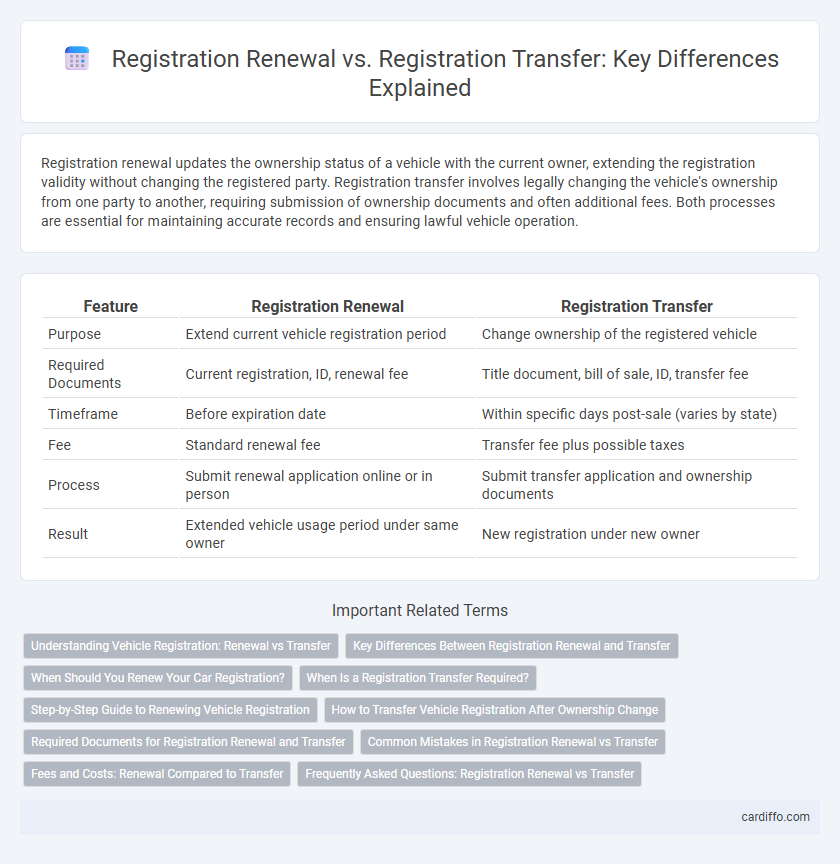Registration renewal updates the ownership status of a vehicle with the current owner, extending the registration validity without changing the registered party. Registration transfer involves legally changing the vehicle's ownership from one party to another, requiring submission of ownership documents and often additional fees. Both processes are essential for maintaining accurate records and ensuring lawful vehicle operation.
Table of Comparison
| Feature | Registration Renewal | Registration Transfer |
|---|---|---|
| Purpose | Extend current vehicle registration period | Change ownership of the registered vehicle |
| Required Documents | Current registration, ID, renewal fee | Title document, bill of sale, ID, transfer fee |
| Timeframe | Before expiration date | Within specific days post-sale (varies by state) |
| Fee | Standard renewal fee | Transfer fee plus possible taxes |
| Process | Submit renewal application online or in person | Submit transfer application and ownership documents |
| Result | Extended vehicle usage period under same owner | New registration under new owner |
Understanding Vehicle Registration: Renewal vs Transfer
Vehicle registration renewal involves extending the validity of the current registration for the same owner and vehicle, ensuring legal operation on public roads without changing ownership. Registration transfer occurs when the ownership of a vehicle changes, requiring the new owner to update the registration details with the relevant motor vehicle department. Understanding the distinction between renewal and transfer is essential for compliance with state laws and avoiding penalties related to expired or outdated vehicle registration.
Key Differences Between Registration Renewal and Transfer
Registration renewal involves updating or extending the validity period of an existing registration to maintain compliance and avoid expiration penalties. Registration transfer entails changing the registered ownership or jurisdiction of an asset or vehicle, which requires documentation proving the new ownership and adherence to local regulations. Key differences include purpose, required paperwork, and legal implications, where renewal sustains current registration status, and transfer legally assigns registration rights to a different party.
When Should You Renew Your Car Registration?
Renew your car registration before the expiration date to avoid late fees and ensure continuous legal driving status. Renewal is necessary when you retain ownership and continue using the vehicle within the same state or jurisdiction. Transfer of registration is required only when ownership changes, such as selling or gifting the vehicle to another person.
When Is a Registration Transfer Required?
A registration transfer is required when ownership of a vehicle changes, such as during a sale, gift, or inheritance, ensuring the new owner is legally recognized. Registration renewal, on the other hand, is needed to maintain the current owner's registration status and keep the vehicle legally operable. Failing to complete a registration transfer promptly can result in legal penalties and complications with liability.
Step-by-Step Guide to Renewing Vehicle Registration
Renewing vehicle registration involves submitting the renewal notice, verifying vehicle information, paying the registration fee, and receiving the new registration sticker. The process differs from registration transfer, which requires ownership change documentation and title transfer before updating registration details. Accurate and timely registration renewal ensures legal operation and avoids penalties.
How to Transfer Vehicle Registration After Ownership Change
To transfer vehicle registration after an ownership change, the new owner must submit the required documents, including the title signed over by the previous owner, proof of identification, and a completed transfer application to the local Department of Motor Vehicles (DMV). Payment of applicable transfer fees and taxes is mandatory to complete the process. The DMV will issue a new registration and license plates if necessary, reflecting the updated ownership information.
Required Documents for Registration Renewal and Transfer
Registration renewal requires submitting a valid identification document, proof of current address, and the existing registration certificate to ensure the accuracy of records. Registration transfer mandates additional documentation, including the original transfer application form, a no-objection certificate from the previous owner, and a valid identity proof of the transferee to legally update ownership details. Both processes emphasize strict adherence to document verification to maintain authenticity and avoid legal complications.
Common Mistakes in Registration Renewal vs Transfer
Common mistakes in registration renewal include missing the deadline, using incorrect or outdated documents, and failing to verify updated vehicle information, which can lead to fines or registration suspension. In registration transfer, errors often involve incomplete ownership paperwork, neglecting to notify the DMV of the transfer, and inaccurate billing details, causing delays or legal complications. Understanding specific requirements for renewal and transfer processes minimizes administrative errors and ensures compliance with state regulations.
Fees and Costs: Renewal Compared to Transfer
Registration renewal fees are generally lower than registration transfer fees because renewal involves updating existing registration details, whereas transfer requires administrative processing for ownership change. Renewal typically incurs a standard cost set by local authorities, often a fixed annual or biennial rate, while transfer fees can include additional charges such as title transfer, taxes, and sometimes inspection fees. Understanding these cost differences helps vehicle owners budget effectively when maintaining or changing their registration status.
Frequently Asked Questions: Registration Renewal vs Transfer
Registration renewal involves updating your existing vehicle registration for continued legal use, often requiring proof of insurance and payment of renewal fees. Registration transfer refers to changing the ownership on the vehicle's registration when selling or gifting a vehicle, necessitating completion of a transfer application and submission of a bill of sale. Common questions include timelines for renewal versus transfer, required documents for each process, and potential fees or penalties associated with missing deadlines.
Registration Renewal vs Registration Transfer Infographic

 cardiffo.com
cardiffo.com